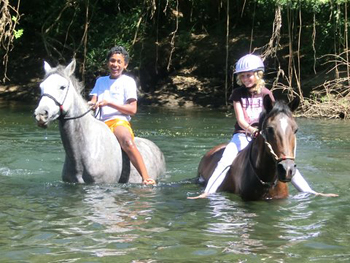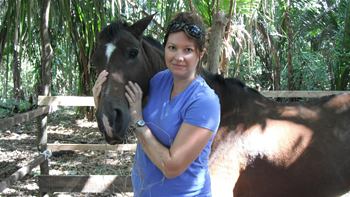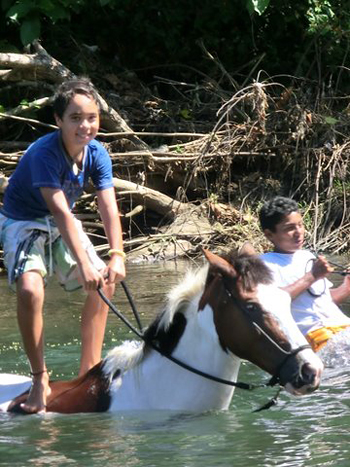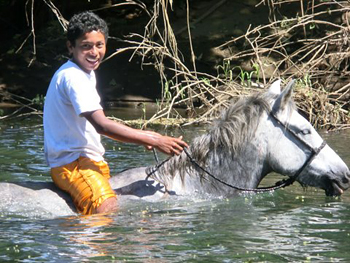There is definitely something special about horses, so much so that working with them can be therapeutic. Nosara resident Carrie Anderson has been working with horses nearly all her life, and now she shares her insight into these equine creatures with others.
“Horses are very sensitive in nature and so they are an excellent gage or barometer when used in a therapeutic manner,” commented Carrie, who started riding when she was just five years old and has a background in equine therapy as well as psychology.
Carrie and her husband Eder Espinoza offer horseback riding tours and riding lessons designed to fit individual interests and special needs, from accommodating someone with a disability like cerebral palsy to designing a yoga horse clinic.
Whenever someone comes for a riding lesson, the first thing Carrie wants to know is what the individual wants to gain from the experience. The next step is for the individual to get to know a little about the horse they are going to ride. Carrie compares learning to communicate better with a horse to learning a language: “Horses are amazing because horses are capable of listening to our language, and we typically don’t tend to listen to theirs.”
She encourages people to pay more attention to their horses, to determine why the animal acts or responds as it does. For example one of Carrie’s horses, Sebastian, has a touch of arthritis, so Carrie wraps braces around his forelegs. He also has bad posture, leaning on his back hip. She tickles his belly and pulls on his tail to encourage him to straighten his posture.
“Horses are wonderful teachers because they will reflect the energy they receive from the person that is working with them. For example, if you push they will push back if you are not focused on the task at hand they will also let their attention be diverted; conversely, if you relax and breath, so will they, and if you are confidant and believe in what you do they will put forth the same effort.”
In fact, connecting with horses can be therapeutic for a person both physically and mentally, and people discover more about themselves in the process.
For men especially, working with horses can help them become better listeners. “Men tend to be less in tune to their listening side,” Carrie explained. “They like to use their muscles to get results, but horses react negatively to that.” She cited her husband as an example. He used to be more physical with horses but has learned that communication is the best way to get results.
|
|
 |
| |
|
| |
 |
| |
|
| |
 |
| |
|
| |
 |
For children, Carrie noted that caring for another creature helps them learn responsibility and empathy. They can also learn to overcome fears. One girl she gives lessons to, for example, is afraid of falling off the horse, but Carrie has been taking her and other kids on horseback to a river where they can fall off on purpose and gradually feel more comfortable on the horse.
“Of course many people are intimidated by horses due to their size and when those fears and insecurities surface it provides a gateway to teaching coping mechanisms and seeing how that individual reacts to a fearful situation,” Carrie related.
In addition, working with horses teaches confidence, trust, how to follow and how to give direction and leadership skills. “Because horses are prey animals, they will not take direction from someone who is fearful or timid or unsure of what they want. In order to get results you must learn to become a leader and to overcome you apprehensions,” asserted Carrie.
Carrie and her husband recently rescued a horse and are guiding Eder’s young nephews to care for and train it. They are also forming a riding group for Costa Rican boys, which will meet on Sundays. The aim of the group is for the boys to have fun, learning horsemanship and games such as barrel racing and lassoing, while getting more in touch with the traditional horse culture of Costa Rica, which has been declining in recent years as more land is bought up and less people are using horses to tend cattle.
Carrie is located past Nomad Restaurant in Nosara. For more information, call 2682-5096 or visit www.playaponies.com.
|

